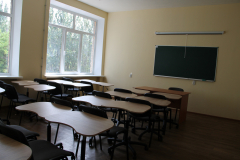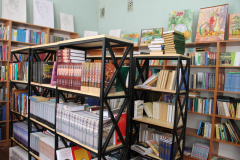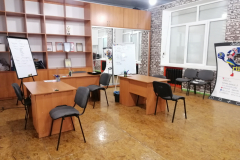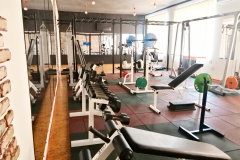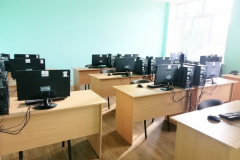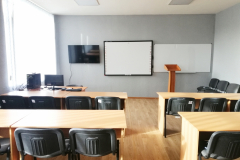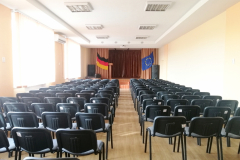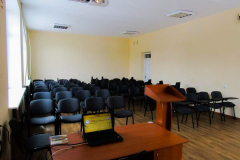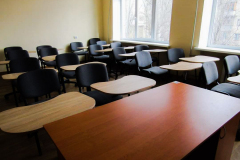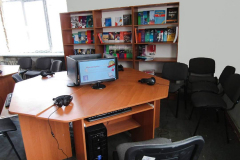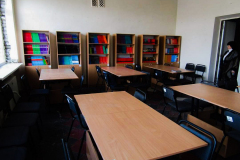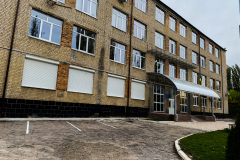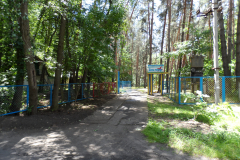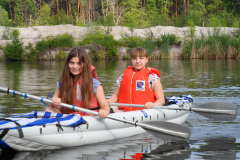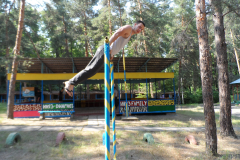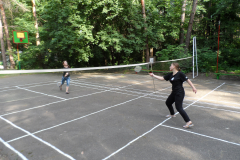 Inyaz began his activity in the field of national education in the autumn of 1949, when the idea of creating an institute of foreign languages on the basis of Bila Tserkva Pedagogical School arose. The task of the new school was to train English and French teachers for grades 5-7 of secondary schools. And already in the 1953-1954 academic year a new reorganization took place - the establishment of the Bila Tserkva Pedagogical Institute of Foreign Languages, which employed 39 teachers. The institute was headed by Karpo Kirillovych Shvachko - Candidate of Philological Sciences, Ukrainian language specialist.
Inyaz began his activity in the field of national education in the autumn of 1949, when the idea of creating an institute of foreign languages on the basis of Bila Tserkva Pedagogical School arose. The task of the new school was to train English and French teachers for grades 5-7 of secondary schools. And already in the 1953-1954 academic year a new reorganization took place - the establishment of the Bila Tserkva Pedagogical Institute of Foreign Languages, which employed 39 teachers. The institute was headed by Karpo Kirillovych Shvachko - Candidate of Philological Sciences, Ukrainian language specialist.
On September 9, 1954, the Bila Tserkva Pedagogical Institute of Foreign Languages was transferred from Bila Tserkva, Kyiv Oblast, to Horlivka, Stalin (now Donetsk) Oblast, and renamed the Horlivka Pedagogical Institute of Foreign Languages, the city's first higher education institution. It was a kind of gratitude of the Stalinist authorities to the miners for their labor victory. Now their children could learn foreign languages.
In Soviet times, the curricula of all higher philological and pedagogical educational institutions provided for the study of both purely special disciplines and a wide range of social sciences and humanities. It was during these years that the famous Gorlovka school of foreign language teaching was formed. Mastering the profession is facilitated by fairly extensive contacts with native speakers of foreign languages. The institute is repeatedly visited by guests from Great Britain, Germany, France and many other countries. Now it is even surprising that, putting the country in a state of de facto isolation, the then authorities made an exception for Gorlovka students.
 The establishment of a higher education institution in Horlivka certainly influenced the social and cultural life of the city. The tradition of holding regular methodological seminars in English and French, which provided qualified assistance to teachers in the city, was established.
The establishment of a higher education institution in Horlivka certainly influenced the social and cultural life of the city. The tradition of holding regular methodological seminars in English and French, which provided qualified assistance to teachers in the city, was established.
Smart and clever students of our institute were creative in organizing their leisure time. In the early 60's the first student ensembles appeared, where solo and choral singing was heard not only in the native, but also in foreign languages, which, of course, adorns and diversifies the performances of urban groups of wind music, dance and drama. A striking episode in the life of the institute and the whole city was the creation of the rock band "Korobeinyky", led by the charismatic leader of future philologists Peter Wattenmachen, or simply Pete. In addition, physical education classes are of special importance: many students-athletes in gymnastics, athletics, shooting, tourism and table tennis came from the ranks of the GDIIM student team, which was usually dominated by girls. Traditionally, our football, volleyball and basketball teams have been strong. Students and teachers could enjoy vacations and holidays in a picturesque corner of the Donetsk region on the banks of the Seversky Donets River, where in July 1963 a sports and recreation camp was opened, the first vacationers of which were the 50 best students. Initially, Altair functioned as a tent camp, but gradually it was equipped with wooden houses hidden among the slender pines of the Lyman forest.
 An important step in improving the quality of vocational training was the introduction of educational programs in the late 70's new list of paired specialties: "Teacher of English and German" and "Teacher of French and German" with a term of study at the faculties of English and French - 5 years. The first graduation of specialists in two languages took place in 1979.
An important step in improving the quality of vocational training was the introduction of educational programs in the late 70's new list of paired specialties: "Teacher of English and German" and "Teacher of French and German" with a term of study at the faculties of English and French - 5 years. The first graduation of specialists in two languages took place in 1979.
An integral part of the educational process of the institute was research work: in 1980/81, 55.3 % students worked in scientific circles and problem groups created at 24 departments.
Further development of the institute was carried out under the guidance of Candidate of Pedagogical Sciences, Associate Professor Halyna Serhiivna Ivanenko (1975-1982) and Candidate of Historical Sciences, Professor Ivan Oleksiyovych Klitsakov (1982-2001).
During the 80's and 90's, the number of students at the institute increased, new specialties and faculties were opened, and the number of teachers, including highly qualified specialists, increased. Full-time doctors of sciences appeared, and international relations were strengthened. In 1992, an agreement on scientific and educational cooperation was concluded between the Horlivka State Pedagogical Institute of Foreign Languages and the Southern University (USA). Relations with Germany developed, primarily with the Goethe-Institut. The German language faculty regularly received reference, scientific and educational literature from Germany. Since 1995, the French language faculty has been inviting lecturers from the Sorbonne and other French universities to give lectures. Students had the opportunity to listen to lectures on literary studies, history of French literature, regional studies. French teachers worked at the faculty almost every year.
In 2001, at a meeting of the labor collective, Professor, Doctor of Historical Sciences Viktor Mykolayovych Dokashenko was elected Rector of the Institute. He had to work in very difficult times, both for our institute and for the education of Ukraine. Competent adjustment was required by all areas of activity of the educational institution. But the Horlivka State Pedagogical Institute of Foreign Languages, despite all the socio-economic difficulties, continued to develop and train specialists in the field of education. The university not only expanded the material and technical base, but also increased the number of faculties and the license volume: the educational process of the institute continued in 8 academic buildings, where almost 3,500 students studied at 8 faculties. Students actively used the library fund, which amounted to more than 27 thousand copies of educational, methodical, scientific and fiction literature, funds of resource centers, as well as Internet resources. The pride of the library was a collection of old prints. International cooperation has reached a new scale. Cooperation agreements have been concluded with more than 10 higher education institutions in Europe. The agreement with the Krakow Academy named after Andrzej Frycz Modzewski, which is still valid today.
The institute underwent significant organizational changes in 2012, when it became part of the newly established Donbas State Pedagogical University as a separate structural unit of the Horlivka Institute of Foreign Languages with its own finances and facilities.
 In the summer of 2014, the staff of the institute found itself at the epicenter of difficult, previously unknown, trials. An armed conflict broke out in the east of the country. This has become a challenge for students and teachers, as well as for the entire population of our region. According to the order of the Ministry of Education and Science of Ukraine dated 31.10.2014 № 1242 "On the organization of the educational process in a separate structural unit" Horlivka Institute of Foreign Languages "of the state higher educational institution" Donbass State Pedagogical University "due to the difficult situation on the ground location and conduct of anti-terrorist operation institute from November 10, 2014 was transferred to the city of Artemivsk (now Bakhmut). Thus, together with twenty higher education institutions of Donetsk and Luhansk regions, our university received the status of a relocated educational institution.
In the summer of 2014, the staff of the institute found itself at the epicenter of difficult, previously unknown, trials. An armed conflict broke out in the east of the country. This has become a challenge for students and teachers, as well as for the entire population of our region. According to the order of the Ministry of Education and Science of Ukraine dated 31.10.2014 № 1242 "On the organization of the educational process in a separate structural unit" Horlivka Institute of Foreign Languages "of the state higher educational institution" Donbass State Pedagogical University "due to the difficult situation on the ground location and conduct of anti-terrorist operation institute from November 10, 2014 was transferred to the city of Artemivsk (now Bakhmut). Thus, together with twenty higher education institutions of Donetsk and Luhansk regions, our university received the status of a relocated educational institution.
On the basis of succession, the institute was headed by Candidate of Philological Sciences, Associate Professor Yevhenia Mykolaivna Belitska, who held the position of Vice-Rector in Horlivka, and later Deputy Director for International Relations.
This year, for the fourth time, GIIM is producing outside its native walls. Therefore, the bitter taste of exile is added to the joy of a job well done. However, neither students nor teachers complain about the fate, but direct joint efforts to rebuild the educational, scientific and technical potential of the institute, especially since the severity of emotional pain from losing their home is largely offset by the hospitality of the city community, noble deeds of friends from other regions. , from far and near abroad.
 Today the university has two buildings, which are gradually being arranged in accordance with modern requirements. The newly formed fund of educational and scientific literature and resource centers help to increase the level of professional training of future teachers of philology. Last year, President of Ukraine Petro Poroshenko cut the ribbon at the opening of a student dormitory. Repair work is underway in the second dormitory. Inyaz kept the main thing - his staff, his traditions, his name. With this he celebrates the seventieth anniversary.
Today the university has two buildings, which are gradually being arranged in accordance with modern requirements. The newly formed fund of educational and scientific literature and resource centers help to increase the level of professional training of future teachers of philology. Last year, President of Ukraine Petro Poroshenko cut the ribbon at the opening of a student dormitory. Repair work is underway in the second dormitory. Inyaz kept the main thing - his staff, his traditions, his name. With this he celebrates the seventieth anniversary.
Throughout its history, the Horlivka Institute of Foreign Languages has come a long way. He had everything on him: serious and funny, cheerful and sad, heavy to the point of insanity, restless, but always caring and sincere. That is why the bright memory of the native alma mater remains in the hearts of our graduates forever. Strong friendship, attentive attitude to the student's personality, constant care for the highest interests of the team have always been a priority for us. Confidence and a bright faith in a better future call us to creative work and new achievements.

